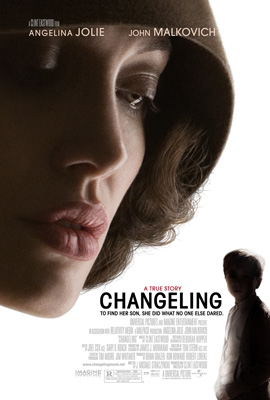Box Office Review: Changeling [2008]
Dec. 8, 2008
Reviewed by Richard Lee Zuras
Released Oct. 31, 2008
2 hr. 21 min.
R
Clint Eastwood/Universal
Angelina Jolie
John Malkovich
Colm Feore
Michael Kelly
 The great thing about streetcars, the kind that used to run in places like 1928 Los Angeles, is that they move so smoothly, so slowly, to a place they are so obviously going. The terrible thing about streetcars is that they move so slowly, and their destination is obvious.
The great thing about streetcars, the kind that used to run in places like 1928 Los Angeles, is that they move so smoothly, so slowly, to a place they are so obviously going. The terrible thing about streetcars is that they move so slowly, and their destination is obvious.
Clint Eastwood’s Changeling feels exactly like a streetcar. And there is a streetcar in this film, moving assuredly up and down the crime-filled streets of Los Angeles in 1928. It is beautiful to look at, as is Angelina Jolie, upon whose face the camera closes and lingers in consistent fashion–looking more at her screen presence than, well, her screen presence. Jolie does tone down her usual video-game antics to slide into this primly dressed, anti-flapper character. For the most part she does a good job, save for a few key moments here and there where she seems to strain at the appropriate method. Though she likely will be nominated, given the dearth of such roles in Hollywood, one wonders what a more accomplished actress like Hilary Swank might have given in said pivotal scenes.
At the center of this film is the nightmare of child abduction, and subsequent serial murders. There may be no heavier subject to undertake. It is a story so disturbing it is almost impossible to tell head-on. And the film knows this. Much of the action centers not around the brutality (awkwardly detailed in an under-directed flashback scene), but around the corruption of the L.A. police force. This part of the story takes up so much of the film that it begins to play like a lesser L.A. Confidential. Where L.A Confidential boasted the acting talents of Russell Crowe, Kevin Spacey, David Straithairn and James Cromwell, Changeling gives us Colm Feore, Angelina Jolie, and Michael Kelly. The one acting bright spot is the iconic John Malkovich–an actor known for stealing scenes he does not disappoint here.
As brutal as the story is, we see much of it before it unravels on screen. At times it reads like an NC-17 Lifetime movie. There is a noticeable lack of attention to editing (one might argue to achieve verisimilitude), lack of score (again…), and for that matter: pathos. There is a large budget here–one that will no doubt not be recouped on U.S. receipts alone. Much of the money, it would seem, went into lavish re-creations of 1920’s L.A. Many of the street scenes are Oscar worthy set designs, and beautifully shot. The toxic red lipstick of the time, the wardrobes, the model T’s–they are all here. Even the unbelievable, smarmy treatment of women is painstakingly reproduced.
In the end, this is a film inspired by real events–a story about to be swept into the trash can that did indeed need to be told. But something is amiss here, given the large budget and the undeniable talents of Clint Eastwood. Perhaps it is simply the film’s complete refusal to explore the rationale (however reprehensible) behind the obviously transgressive behaviors of the exploiting parties.
Bottom line 3.5/5.0

